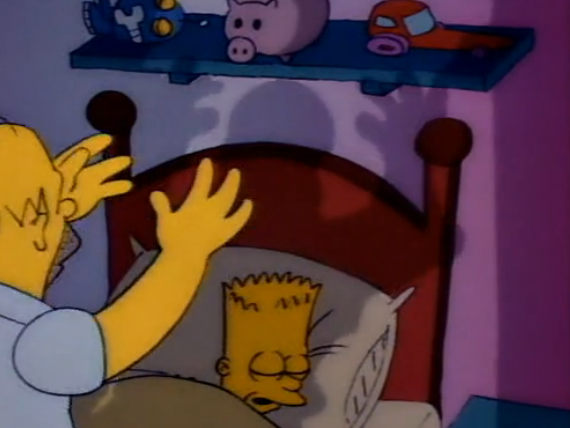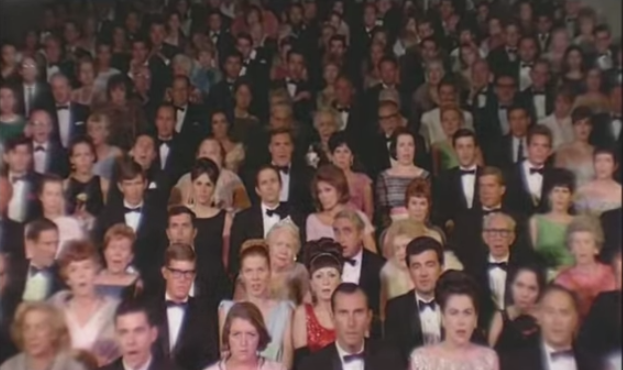In which Homer is
one reckless driver away from suicide.
Vitals
Title: Homer’s Odyssey
Air Date:
January 21, 1990
Episode
No.: 7G03
Writer: Jay
Kogan and Wally Wolodarsky
Director:
Wes Archer
Do you remember the time that Homer, depressed because he
was out of a job and out of beer, stole Bart’s piggy bank, left a suicide note
in the kitchen, and got all the way to the edge of a bridge tied to a boulder?
Remember when Bart and Lisa found the note and ran terrified into Homer and
Marge’s bedroom and then rushed off to find him and convince him not to kill himself. Remember when Homer didn’t
jump of the bridge because a car almost ran down his family as they rushed to
keep him from jumping? Remember when the driver, who almost killed an entire
family, didn’t even slow down.
All of that happened in this episode. Seriously, Homer’s Odyssey is that dark. Usually
the Simpsons uses subversive or absurd humor to undercut serious moments, but not here. In Homer's Odyssey they play it straight. The
jokes actually make the story even darker. More on that when we
come to it.
Homer’s Odyssey starts innocently enough and, as was
common in the early years, Bart carries the bulk of the first act. Mrs.
Krabappel’s class is taking a field trip to the nuclear plant
and she is determined that it will go better than last year’s trip to the local
prison. Otto arrives late with the bus and has a slightly creepy conversation
with Bart and reveals the tattoo he somehow received while blackout drunk the
night before.*
Bart is last on the bus and gets stuck next to car-sick Wendell, but still manages to play the class clown. Sherri and Terri take advantage of Bart’s bad
reputation to get him trouble with a double kiss on the check.
He cries out in discomfort and, as punishment, has to sing “John Henry was a
Steel-Driving Man.” It’s an enjoyable, random humor aside, and gives Bart yet
another chance to show off his parody song stylings. Eventually they arrive at
the plant, after taking a “shortcut” that requires an extra trip past the
school and the prison, where the prisoners seem to remember last year's field trip fondly. Bart slaps Wendell on the back to celebrate a vomit-free
ride which causes him to throw-up and drive the children out of the bus and
past an inattentive guard.**
Inside the plant the children fill the occasionally-seen
auditorium where they are greeted by Smithers in his first extended appearance.
Showing that they didn’t have all the details pinned down yet Smithers is black.
The character still looks good, but with 25 years of opposing history it’s a
bit strange. We are also greeted with the show's first educational film strip, which
looks great. It actually pretty educational (for real) and cut with a
touch of crass propaganda. In one of the DVD commentaries the animators mention
that to get the dirty, old film strip look they physically aged the film with
dirt and scratching. That work is on display here and really does the
trick.
After the film we cut to Homer lazily eating a donut in his
golf cart. His lazy indifference is clearly unpopular with his more professional coworkers, one of whom mocks him while sipping a cup of coffee. Realizing Bart is in the building, Homer rushes
off to meet the kids and impress his son with his big job. However he is distracted waving at Bart and crashes into a steam pipe, which causes a minor crisis
(level 1 of 4). The other employees fix the problem and Sherri and Terri’s
father fires Homer on the spot.
It apparently takes only one day of unsuccessful job-hunting
to throw Homer into a serious depression. He’s just a technical supervisor in a world that only wants supervising technicians. He stops
to drown his sorrows at Moe’s and we get the first prank call of the series
proper (Mr. I.P. Freely), but Homer is quickly thrown out when he runs out of
money and Moe kicks him when he’s down by telling him he’ll never get back on
his feet (but they’re still friends!).
A pit stop in the rarely seen Simpson rumpus room.
Homer’s depression worsens as he fails to find a job for
some unknown amount of time. Marge goes back to her pre-marriage job as a skating
waitress at a drive-in. Finally, unable to sleep and desperate for a drink, Homer steals Bart’s piggy bank for the money (there isn’t enough) then decides
to commit suicide.
He writes the note, which is recited in full, but includes no jokes and leaves no lasting impression, ties himself to a boulder, and sets off for the bridge, stopping to oil the hingers on the fence, another attempt to cut the tension that falls flat. For a reason that is never explained Bart and Lisa are up
in the middle of the night and quickly discover Homer’s suicide note and wake
Marge. The family gives chase, reaching the bridge just before Homer jumps.
They call out and run into the road towards Homer, In a moment of serendipity a driver
barrels into frame, apparently not seeing the family. Homer acts on
instinct, charging into the street and saving the family. Angered by the
dangerous intersection, Homer finds new meaning in his life, by advocating for
public safety through improved signage. A newspaper montage leads up through his
successful campaign.
His safety movement finally leads Homer to take on the
nuclear plant itself (which he knows is the most dangerous place in the
city). A protest rally assembles outide the gates and Homer is invited up the
negotiate. Burns attempts to buy Homer off with a job offer, which Homer
accepts, at until Burns asks him to sell-out completely by telling the crowd the
plant is safe. Homer refuses and (accidently) negotiates a much better deal,
by telling Mr. Burns that time he spends working is time he can’t spent
agitating. Burns agrees and Homer becomes the plant’s safety inspector. He celebrates by dancing on the railing of Burns’ balcony before falling and being
carried of by the crowd.
This is a dark episode and watching it as
an adult is an uncomfortable experience. There is nothing wrong with a comedy
taking on suicide, in fact it can be easier because of the chance to insert humor. Here though it's just sad. While The Simpsons typically relies on absurdity and bravado to push through tough issues, here the humor only serves to dig
the hole deeper. In particular, this episode includes what I think is the
darkest joke in the series. Homer, as he is walking to his death already tied
to his boulder, passes in front of Mr. and Mrs. Winfield, elderly,
seldom-seen neighbors, known only for their disdain for the Simpson family. Mrs.
Winfield looks at Homer and says with obvious pleasure: “Looks like young
Simpson is going to kill himself,” and Mr. Winfield responds, incredulously,
“Maybe be just taking his boulder for a walk.” Then they laugh. They know he’s
going to kill himself and they celebrate. Its serious, and real, and awful.
The episode’s worst crime, though, is that it refuses to
address the ramifications of Homer’s actions. Without enough humor to charge
past Homer’s suicide attempt and make the story into a farce, his addiction and
depression are allowed to fester, tainting his redemptive arch, and making the last second return to the status quo feel like a cheat.
Think about it, Bart and Lisa actually read his suicide note and see him
standing on the precipice, but their psychic trauma is never addressed. All the bad is brushed aside once
Homer starts his safety campaign, despite hints that he hasn’t worked through
all his issues. Yes, it’s a cartoon, but this is the second episode in a row in
which one of the main characters illustrated that they have serious problems that
need to be addressed, but instead accepts a bandaid and a return to the status
quo.
I can’t allow negatively to completely mar this episode, so
I’ll mention what I think is one of the best staged shots from
the show at any point. Just before Homer decides to commit suicide and desperate for a drink he stoops to sneaking into Bart’s room and steal his
piggy bank. The bank is staged on a shelve about Bart’s head and the scene is
shot from somewhere near the ceiling. Homer reaches over Bart casting a menacing shadow. His outstretched arms and grasping fingers make the shadow
look like a monster The specter of Homer’s
addiction is visibly manifested as a nightmare that is consuming his vulnerable children. In an episode I
don’t much care for it’s a true moment of genius.
Beyond that, I don’t have much to commend about this outing. Its
suffocated by a heavy plot that leaves no air for laughter after the first act.
Even though the animation is good enough and the voice work is great, the episode never comes to together and, unlike most first season episodes, provides few hints of the greatness to come.
*This is the second time in the first three
episodes that Bart displays a fascination with tattoos. He says he wants one and Otto tells him he has to wait until he’s 14. Bart seems to forget
that he already had a tattoo and paying for its removal almost ruined
Christmas.
**The guard bears a disturbing resemblance to
Homer, down to the feet on the desk and donut in hand.
Running Gags
Homer’s Odd
Job Count: 2 (Public Safety Advocate – Non-Costume Edition).
Marge’s Odd
Job Count: 1 (Drive-in Waitress).
Weird
Introductions to Classic Characters
Waylon
“Wait He Started Out Black” Smithers
Otto “Actually Pretty Creepy” Mann
Police Chief Clancy “Vaguely
Competent” Wiggum
Animation Corner
Wes Archer, at least during his years at The Simpsons, loved to make his characters elastic. If you've ever listened to audio commentary tracks on an early Archer episode, you've heard discussion about the quirky moves he slipped into the animation to the apparent consternation of Matt Groening. The combination of that fluidity and first season wonkiness, led to things like this giraffe neck Marge.
Jeff Alpertson’s Obsessive Watcher Moment
We get a brief glimpse at the
adorable, radioactive monster Blinky the three-eyed fish. Blinky makes frequent
appearances across the show and his (temporary) death creates the pivotal
moment for Mr. Burns’ unsuccessful gubernatorial campaign in Two Cars in Every Garage, Three Eyes on
Every Fish. Burns, in an attempt to show he understands the common man
joins the Simpson family for dinner on election night. Marge, angry that Homer
planned the dinner without her knowledge, serves Blinky, who is a symbol in the campaign of Burns’
irresponsible management of the plant. To prove the plant isn’t a danger Burns
attempts to eat Blinky, but fails, spitting a morsel across the dining room and
dooming his campaign before it hits the ground.
Things That Might Amuse No One But Me
My favorite small moment of the
episode is right at the beginning. Mrs. Krabappel warns the class to keep their
arms inside the bus so they won’t be like the kid who got his arm ripped off by
a truck. Bart, ever the class clown, pulls an arm into his shirt and, in a
perfectly pitched Tennessee Williams’ heroine’s voice yells “And I was that
boy.” Great voice work from Nancy Cartwright showing off Bart’s theatrical
side.







